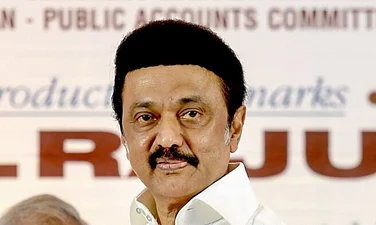JYOTI Basu, who so very nearly became the 11th Prime Minister of India, is said to have told a colleague that the situation arising out of the CPI(M)'s decision not to participate in any government the Third Front may try and form was the biggest political crisis for the party in the past 30 years. The May 13 decision of the CPI(M)'s Central Committee to opt out of a possible Third Front government has led to a furious debate not only within the party itself but also in the ranks of its allies where the resentment towards the CPI(M) is palpable. And while the cracks are showing in the CPI(M), there are ample signs that an acrimonious inner-party debate has only been delayed till after May 31.
According to Harkishen Singh Surjeet, CPI(M) general secretary: "The controversy over the decision should not be raised at the moment. Despite the decision, we are trying to unite everybody. The decision was taken for other reasons and these can be discussed later, after the BJP government has been brought down. There were differences at the time of the Central Committee meet but the situation is better now."
But the search for the villain of the piece has already begun. Party sources point out that those who were against the CPI(M) joining a government—which includes a sizeable section of the Central Committee members from Kerala and, to a lesser extent, West Bengal, along with Prakash Karat, Kerala Chief Minister E.K. Nayanar and some other members of the politburo—have their arguments ready. For them, the extended flirtation of the CPI(M) with 'bourgeois politics' remains just that and not a consummation devoutly to be wished.
Says a senior CPI(M) leader: "Those within the party who accuse us of not understanding the complexity of Indian politics are wrong. Our complete support is with the coalition because we understand these complexities. We just do not want either our party, its policies or the leadership to be compromised by joining a government dependent on the Congress for survival." Others hark back to the 1967 resolution adopted by the party which made it clear that the CPI(M) should not participate in any government unless it was in a position that would enable it to significantly influence policy.
But the primary reason for their decision remains one of realpolitik—"it would be impossible to participate in a Congress-supported government because of the situation in Kerala, West Bengal and Tripura where the Congress is our main political opponent. We would lose our base in the country if we agree to any such proposal," says a Central Committee member. "And anyway, it is the right of any party to look after its own interest," he adds.
But neither the CPI(M) leaders in favour of joining a Third Front government, nor the party's allies—the CPI, Janata Dal and regional parties—are willing to buy these arguments. For them, all the CPI(M) has done is to make clear that the party is still firmly in the hands of the old-style party apparatchiks for whom alleged ideological purity, a misplaced sense of exclusivity, and its ambition—"which may take a long time to be realised"—to be the decisive force, remains a cornerstone.
Says a senior CPI office-bearer: "Do you think the Central Committee would have decided not to participate in the government if the Third Front had got a few more seats and did not need the support of the Congress? All this talk of upholding the 1967 resolution is only an attempt at providing an ideological veneer to a decision motivated purely by self-interest in the Left-ruled states. I have absolutely no objection to the CPI(M) looking after its own interests, even though in this case it could be at the cost of rupturing the social fabric of the nation as it has let the BJP in, but at least they should say so."
The CPI(M) members who wanted the party to join the government feel that even in purely political terms, the possible benefits of, say, a Jyoti Basu-led government at the Centre could have off-set most of the disadvantages. According to a Central Committee member of West Bengal, "the problems caused by such an arrangement in the Left-dominated states could have been explained in terms of the national interest. That is the advantage of being a cadre-based party. But one needs political will to take such a decision. We may have made inroads in north India, which we have failed to do in 30 years."
A section of the CPI(M) is also coming around to the view that there are signs of an intra-party power struggle linked to the Central Committee decision. Surjeet, who along with his politburo colleague Sitaram Yechuri had tried to unify the various regional forces, is "very disappointed" with some of his colleagues and the innuendo that his priority is not the party, say sources close to him. Unconfirmed reports that he had offered to resign during the emergency Central Committe meet persist despite official denials. And Jyoti Basu, the other senior leader who, sources say, was very keen that the CPI(M) join a Third Front government—not for any personal gain but because the national interest demanded it—did not have his way either. In fact, Basu, who went back to Calcutta to take over as chief minister for the fifth time last week, was reported to have said that the option of joining a Third Front government could still be reviewed.
"The CPI(M)'s only aim at the moment is to keep the Third Front united by countering the BJP propaganda that if the regional parties vote against it, the President will call the Congress to form the government and they will be left with a Hobson's choice—support the Congress, the raison d'etre for their existence, or face the electorate again. If the BJP government survives, we are sure to be blamed and the inner-party divisions might get aggravated," adds a CPI(M) politburo member.
The CPI and Janata Dal, on the other hand, seem most peeved at the fact that the section of the CPI(M) opposed to join-ing the government left it to the last moment to announce its decision and thereby effectively stymied the Third Front's attempts to maintain even a facade of cohesion. Senior CPI leader M. Farooqi feels that the CPI(M) is 'a divided house'. "At least at a time when the BJP was poised to usurp power they should have had a national perspective and not been governed by regional considerations," he says. The CPI(M)'s other Left allies say the same.
The growing feeling among a section of the CPI(M) and its allies seems to be that the main party of the Indian Left has 'failed the nation in its hour of truth'. For them, the polemical exchange between Lenin and Rosa Luxembourg—when the former, in a pamphlet, coined the phrase 'one step forward and two steps backwards'—has come back to haunt the CPI(M).


























